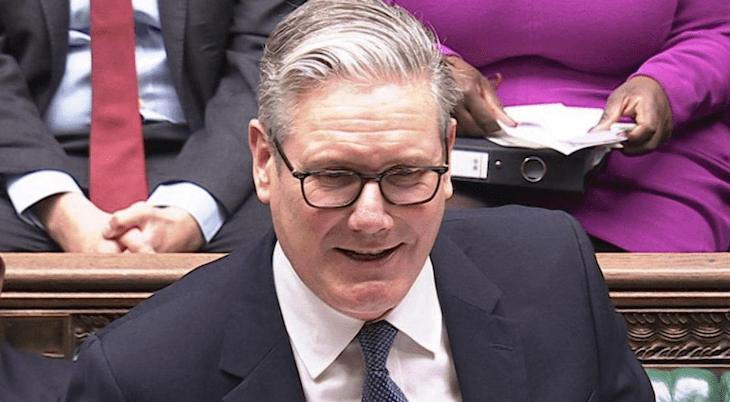The arrest warrants for Israeli prime minister Benjamin Netanyahu and former defence minister Yoav Gallant should be the last the International Criminal Court (ICC) issues.
The ICC accuses the men, whose nation is embroiled in a multi-front war against enemies sworn to its destruction, of using ‘starvation as a method of warfare’, ‘murder, persecution and other inhumane acts’, and ‘intentionally directing an attack against the civilian population’. Merely to say the charges out loud is to expose their absurdity. Not only is there no evidence that Israel is denying the Palestinians food as a military tactic, there is copious evidence to the contrary: 1.1 million tonnes, to be precise. That is how much humanitarian aid, 79 per cent of it food, has been transferred into Gaza since October 7 2023 under Israeli supervision.
There is no evidence that Israel is denying the Palestinians food as a military tactic
Absurdity is one thing, but malevolence is another. It is an act of wicked cruelty and sadism to invert the truth as the ICC does and accuse Israel of murder, persecution and inhumane acts, the very crimes to which its citizens were subjected by Palestinian invaders on October 7. The accusation that Israel intentionally targets civilians is simply a lie: the Israel Defence Forces routinely warn civilians in advance of military operations to allow them to vacate the area. Capping off the obscenity is that on this occasion only one warrant was issued against the Palestinian side. That was for Hamas terror chief Mohammed Deif, who has been dead for five months.
While those who don’t take an interest in Middle East affairs might dismiss this as another row among Western sympathisers of Israel and the Palestinians, there are fundamental matters of law, convention and custom at stake. The ICC has no jurisdiction over Israel, which is not a party to the Rome Statute. A state can invite the court to rule on a matter related to its territory and volunteer to accept its jurisdiction, which the Palestinian Authority has done as part of a long-term strategy to gain a foothold in international bodies and use it to wage diplomatic warfare against Israel. However, the Palestinian Authority is not a state and exercises no meaningful sovereignty over Gaza, which is run by Hamas. The ICC has involved itself because doing so suits its institutional politics and preferences.
It might seem unwise for Western nations to tolerate such overreach, given the potential for it to come knocking on their door one day. NGO Monitor’s Anne Herzberg explains:
‘A lot of these countries are thinking that the court won’t come for them, because they foot the bill for the court. When you look at who the court is active against, it’s African countries and non-member countries. Even though European countries — the UK, France, the Netherlands — have committed similar acts to what Israel is accused of, they foot the bill for the court. Europeans are banking on this never happening to them.’
There is something else at work: the ubiquity across the West of governing elites who are, by ideal and instinct, post-national. They prefer the higher calling of global governance, and its hollow but noble-sounding processes, to the pursuit of their own country’s material and strategic interests. If the ICC were to turn on their country, it would only be because their country deserved it.
Not everyone is quite so enervated by national self-loathing. Donald Trump, recognising that targeting Israel sets a precedent for a future onslaught against the United States, has already put the ICC on notice. His nominee for national security adviser, Mike Waltz, told the court to ‘expect a strong response’ come January.
But what should that response look like? Bluntly, the incoming Trump administration should sanction the ICC out of existence. It should diplomatically nuke this lawless court from space by freezing its bank accounts, limiting travel by its staff, and telling allies to choose between their relationship with Washington DC and their fealty to a failed and broken institution. The United States should place such an onerous burden on the ICC that it can no longer function and make its ongoing existence such a headache for other governments that they agree to tear it up and start again.
There is already a model for how the president-elect might proceed, provided by the man himself. When the ICC opened an investigation into the Americans’ prosecution of the Afghanistan war in 2020, President Trump objected on the grounds that the United States had not ratified the Rome Statute and was not a party to the court or its jurisdiction. He signed Executive Order 13928, which imposed economic sanctions on the ICC including by blocking the assets of all persons involved in the court and its Afghanistan investigation, or those providing ‘material assistance’ to that endeavour, as well as barring entry to the United States by ICC staff and their immediate family. Trump later imposed additional sanctions on the court’s prosecutor Fatou Bensouda and other senior staff. As usual, all the clever people pouted and protested, warning of dire consequences for the United States, and as usual they were proved wrong. The Afghanistan probe has gone nowhere.
It is not only the ICC but those who collaborate with it who need worry. Republican senator Lindsay Graham says he will be introducing a Bill to punish nations that cooperate with the ICC’s attack on Israel, warning: ‘If you aid and abet the ICC after their action against the State of Israel, you can expect consequences from the United States.’
The court and its allies will also be mindful of Section 2008 of the American Service Members’ Protection Act 2002. This authorises the president ‘to use all means necessary and appropriate to bring about the release’ of certain persons ‘being detained or imprisoned by, on behalf of, or at the request of the International Criminal Court’. The legislation protects US citizens but also the political and military leaders of major American allies, and even specifies the State of Israel. Anyone wondering what ‘all means necessary and appropriate’ means might wish to consult the law’s informal title: the ‘Hague Invasion Act’.
This is how a self-confident nation acts, a nation with the guts to stand up for itself and its allies, instead of bending the knee to every crummy outfit which dons the cloak of ‘international law’ and the ‘rules-based global order’ to calumny and undermine the civilised world. The prospect of the ICC’s demise would no doubt scandalise foreign policy elites, the NGO racket, the lawfare industry and academics of international law and human rights, which is exactly why they should resist politicisation and activism from such institutions. It is they who ought to have shouted the loudest about the need for the ICC and other bodies to remain within their remit, and for international law to avoid the trap of becoming the continuation of policy by other means. That they have still not learned their lesson is attested to by the fact that so many legal practitioners and commentators have colluded in, or consciously ignored, the gross distortion of legal text and principle which has seen Israeli self-defence since October 7 routinely characterised as genocide. Many of those who prate the loudest about law and process have done far more than Benjamin Netanyahu or Donald Trump to debase and discredit both.
The ICC was established to bring tyrants and human rights abusers to book, but today you have more to fear from this body if you are the elected leader of a democracy striving to protect its citizens from barbarism. The court has dragged itself and the laws it purports to uphold into a mire of politics, prejudice, caprice and improper process. It is no longer fit for purpose and its continued existence harms the global purchase of international law. The International Criminal Court must fall.








Comments